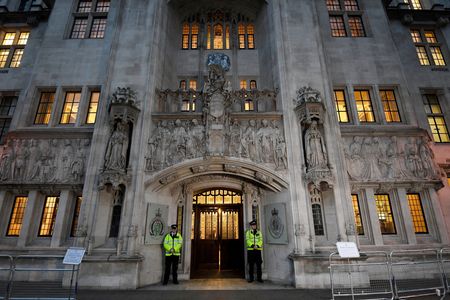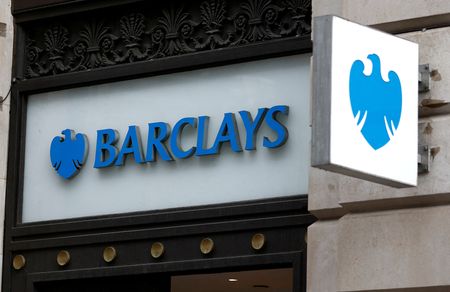By Sinead Cruise and Iain Withers
LONDON (Reuters) -Britain’s Supreme Court will make a landmark ruling on Friday on car finance commissions that could lead to consumer claims of billions of pounds in compensation from banks and other finance firms.
The judgment is expected after financial markets close in London on Friday.
The Supreme Court has been reviewing an earlier Court of Appeal ruling that found it was unlawful for lenders to pay commissions to motor dealers without a customer’s informed consent.
Lenders, including Lloyds Banking Group, Close Brothers, Barclays and the UK arms of Santander and Bank of Ireland, have already set aside nearly 2 billion pounds ($2.7 billion) between them to cover potential compensation claims.
Some analysts say the banks may face the most significant payouts since the almost 40 billion pounds in compensation to customers for mis-selling payment protection insurance, which was largely paid out by a 2019 regulatory deadline for doing so.
WHAT WILL THE SUPREME COURT CONSIDER?
Reviewing three earlier claims – two against South African lender FirstRand and one against Britain’s Close Brothers – the Supreme Court will decide the extent of car dealers’ legal responsibility to provide appropriate information to consumers when also acting as credit brokers.
The court is also expected to rule on whether commissions paid by lenders to car dealers were secret and whether lenders acted unfairly.
WHO MIGHT BE AFFECTED?
The Financial Conduct Authority banned the payment of discretionary motor finance commissions in 2021. But some customers say they were treated unfairly before the ban came into effect, prompting the FCA to launch an investigation in January 2024 into historic potential misconduct.
If the Supreme Court rules that lenders and brokers should have been more transparent about commissions, the regulator has said it will consult on the structure of a compensation scheme within six weeks.
More than 2 million people a year rely on the motor finance market to buy a car, FCA data shows.
HOW MUCH COULD BANKS HAVE TO PAY?
Only a handful of UK lenders have motor finance businesses large enough to be materially affected by the ruling.
These include Lloyds, Close Brothers and Santander UK, which have already made provisions of 1.15 billion pounds, 295 million pounds and 165 million pounds respectively. Bank of Ireland Group’s UK arm and Barclays have made smaller provisions.
But analysts say other types of commissions paid by banks to credit brokers could face scrutiny if the court decides customers must consent to such payments.
Total “worst case” industry costs could reach 30 billion pounds, ratings agency Moody’s said in November.
RBC Capital analysts estimated the impact on banks and non-banks could be around 11 billion pounds in a revised estimate this week.
COULD THE GOVERNMENT STEP IN?
Press reports have suggested that Britain’s finance minister Rachel Reeves is considering changing the law to shield lenders from the worst of the potential fallout, potentially to supersede any Supreme Court judgment.
A Treasury spokesperson said the ministry did not comment on speculation and wanted to see a balanced judgment. “It is now appropriate to let the appeals process run its course,” the spokesperson said.
The government expressed reservations in January about the earlier Court of Appeal ruling, adding it wanted to see a “fair and proportionate judgment” on motor finance that balanced claims with ensuring lenders could continue to provide finance.
($1 = 0.7526 pounds)
(Reporting by Sinead Cruise and Iain Withers. Editing by Mark Potter, Barbara Lewis and Kate Mayberry)











